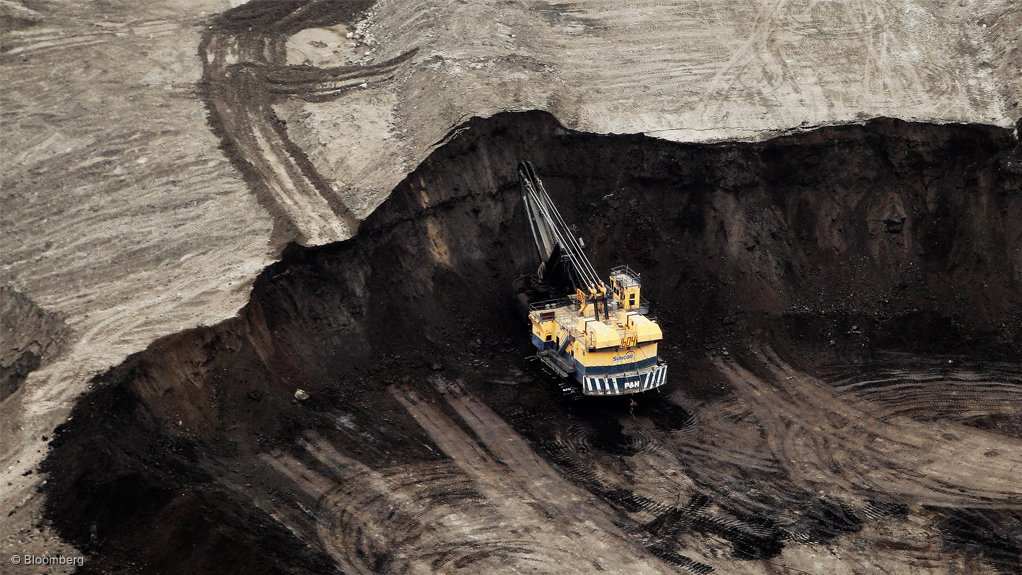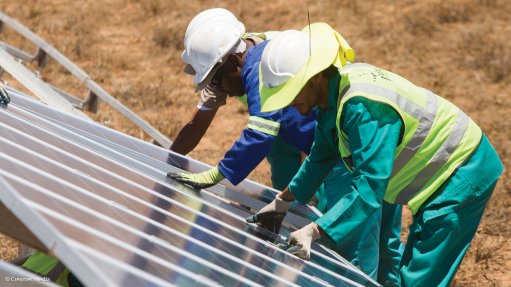Oil lobby calls for closer teamwork to enhance Alberta’s crude competitiveness


The Alberta oil patch provide significant provincial and national economic growth opportunities
Photo by Bloomberg
VANCOUVER (miningweekly.com) – The Canadian Association of Petroleum Producers (CAPP) is calling for increased collaboration between industry and government to increase the global competitiveness of Alberta’s oil patch.
More than 24 000 new jobs could be created for Albertans, with provincial economic growth estimated to add about C$5-billion over the next three years, according to the CAPP’s latest report, ‘A Competitive Policy and Regulatory Framework for Alberta's Upstream Oil and Natural Gas Industry’.
"Our proposal to streamline provincial and federal policies and regulations has the potential to achieve regulatory efficiencies, eliminate duplication and create a framework for shared sustainable prosperity in Canada,” CAPP president and CEO Tim McMillan said in a press release on Wednesday.
According to McMillan, there is uncertainty around the changes to government policies and regulations, which has resulted in increased cost burdens to the industry, ultimately affecting the upstream oil and natural gas sector's ability to attract investment.
"Opportunities exist for industry and government to work together to meet a common goal – to responsibly grow oil and natural gas production to strengthen the economy and get Albertans back to work,” McMillan noted.
POLICY BURDEN
The CAPP argued that the domestic oil industry continues to face mounting costs and barriers to growth. This is owing to changes in provincial and federal government policies and regulations relating to methane emissions, carbon pricing, municipal and corporate tax increases, wetland policy, well liability and closure and caribou management, among others.
Low global commodity prices, rapidly changing market dynamics and new policy directions in the US have led to negative impacts on oil and natural gas investment and competitiveness in Canada. The North American benchmark oil price fell 3.3% on Wednesday to $45.50/bl on fears of rising Organisation of the Petroleum Exporting Countries output.
The CAPP estimates that the cumulative cost associated with the changes in provincial and federal government policies and regulations to conventional and unconventional development could range between C$450-million and C$760-million a year in the near term. Overall, capital spending in Canada is forecast to be C$44-billion in 2017 – a 46% decrease from C$81-billion in 2014.
Meanwhile, spending in the US is expected to rise 38% to C$120-billion this year.
The CAPP's report outlines how new competitiveness measures could be created to attract investment and create jobs in Alberta's oil and natural gas sector, while protecting the high standards already in place for health, safety and environmental regulation.
Calling for a “made-in-Alberta” approach to competitiveness, the CAPP stated that only through collaboration with government on essential policy challenges could the energy sector attract new investment to Alberta and improve its competitiveness. It is critical that Alberta and Canada compare their policies and regulatory regimes with the US – its only significant market for oil and natural gas exports and its biggest competitor for capital,” the association stated.
The CAPP estimated that unemployment in Alberta could be reduced by nearly 25%. “We can [also] generate C$4.5-billion in gross domestic product (GDP), C$207-million in additional income tax and C$79-million in additional royalties in the near term on an average annual basis,” the CAPP said.
NATIONAL COMPETITIVENESS
It is not only Alberta that will benefit from increased oil and gas development. The association expects Canada will need more pipelines built through to 2030 to transport an additional 1.3-million barrels a day of oil sands production to markets across North America and to new markets worldwide.
Canada is the sixth-largest oil producer in the world, with 2015 estimates placing the country's identified reserves at third globally, after Saudi Arabia and Venezuela.
The CAPP last month published its ‘2017 Crude Oil Forecast, Markets and Transportation’ report, outlining an expected 33% growth trajectory for Canadian crude production by 2030. This is supported by estimates by the International Energy Agency that global energy demand is forecast to grow 31% by 2040. A total of 27% of this demand growth will be met by oil, the largest total source of energy.
Canada’s oil sands are positioned to become a significant supplier in meeting this future global need.
Overall, Canadian oil production will grow to 5.1-million barrels a day in 2030, up from 3.85-million barrels a day in 2016. This 1.3-million-barrels-a-day growth will be driven by a 53% increase in forecast oil sands production of up to 3.7-million barrels a day in 2030, up from 2.4-million barrels a day in 2016.
Conventional oil output is expected to remain flat, producing 884 000 bbl/d on average throughout the outlook.
New offshore output from the Hebron project, in Newfoundland and Labrador, expected at the end of 2017, will contribute to a rise in eastern Canadian output to 307 000 bbl/d by 2024, but thereafter, due to natural declines, forecast output will drop to 186 000 bbl/d by 2030.
According to the CAPP’s report, the projected growth will exceed the existing pipeline transportation capacity, highlighting the urgent need for pipelines heading east, west and south.
The pipeline network can currently transport four-million barrels a day of oil and oil products but, by 2030, it will need to move more than 5.5-million barrels a day. The CAPP further noted that increased pipeline capacity to reach more Canadians and new, growing markets around the world would ensure that Canada remains globally competitive.
Alberta’s oil and gas industry is also a boon to other local economies, as shown in an independent study prepared by AppEco last month, which found that between 2014 and 2015, Canada’s oil sands generated significant economic benefits for Quebec, including about 16 200 jobs, C$1.25-billion in GDP and C$215-million in government revenues.
Comments
Press Office
Announcements
What's On
Subscribe to improve your user experience...
Option 1 (equivalent of R125 a month):
Receive a weekly copy of Creamer Media's Engineering News & Mining Weekly magazine
(print copy for those in South Africa and e-magazine for those outside of South Africa)
Receive daily email newsletters
Access to full search results
Access archive of magazine back copies
Access to Projects in Progress
Access to ONE Research Report of your choice in PDF format
Option 2 (equivalent of R375 a month):
All benefits from Option 1
PLUS
Access to Creamer Media's Research Channel Africa for ALL Research Reports, in PDF format, on various industrial and mining sectors
including Electricity; Water; Energy Transition; Hydrogen; Roads, Rail and Ports; Coal; Gold; Platinum; Battery Metals; etc.
Already a subscriber?
Forgotten your password?
Receive weekly copy of Creamer Media's Engineering News & Mining Weekly magazine (print copy for those in South Africa and e-magazine for those outside of South Africa)
➕
Recieve daily email newsletters
➕
Access to full search results
➕
Access archive of magazine back copies
➕
Access to Projects in Progress
➕
Access to ONE Research Report of your choice in PDF format
RESEARCH CHANNEL AFRICA
R4500 (equivalent of R375 a month)
SUBSCRIBEAll benefits from Option 1
➕
Access to Creamer Media's Research Channel Africa for ALL Research Reports on various industrial and mining sectors, in PDF format, including on:
Electricity
➕
Water
➕
Energy Transition
➕
Hydrogen
➕
Roads, Rail and Ports
➕
Coal
➕
Gold
➕
Platinum
➕
Battery Metals
➕
etc.
Receive all benefits from Option 1 or Option 2 delivered to numerous people at your company
➕
Multiple User names and Passwords for simultaneous log-ins
➕
Intranet integration access to all in your organisation


















